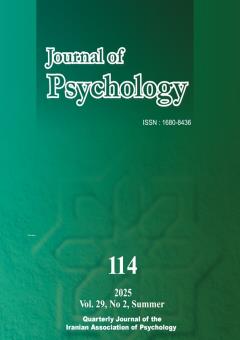The role and status of mental disorders’ classification schemes in the representation of clinical psychology and psychiatry knowledge
Subject Areas :
1 - Department of Clinical Psychology, Faculty of Education and Psychology, and Institute for Transformation in Huminites, Faculty of Economics, Management and Social Sciences, Shiraz University, Shiraz, Iran. Email: mgoodarzi@rose.shirazu
Keywords: classification schemes of mental disorers, DSM-V, ICD-10, science production,
Abstract :
In this article, the relationship between classification and science production in psychiatry and clinical psychology has been explored. Mental disorders’ Classification schemes provide the possibility to represent the phenomena and relationships discovered in the knowledge of psychiatry and clinical psychology in a practical format. In this article, the types of classifications used in the knowledge of psychiatry and clinical psychology and their advantages and disadvantages, and the most common classification used in these fields, which is based on the evolved medical model, were reviewed. It can be concluded from the discussed topics that the common classification in psychiatry and clinical psychology is not based on the genuine nature of the subject matter and the changes made in these two fields, but it has mainly been influenced by the changes that have occurred in science in general and especially biological and medical sciences. Therefore, in order to deal with the real nature of the subjects investigated in the field of clinical psychology in accordance with the developments that have occurred in it in the last few centuries and to meet the needs of therapists and people with mental problems, there is a need to change the intellectual paradigm on which the classification of mental disorders is based.
رضویه، اصغر. (1393). روشهای پژوهش در علوم رفتاری و تربیتی. شیراز: انتشارات دانشگاه شیراز.
گودرزی، محمدعلی. (1402). دین اسلام و طبقهبندی اختلالهای روانشناختی. فصل پنجم کتاب مقدمهای بر روانشناسی دین تألیف ترخان و همکاران. تهران: انتشارات ارجمند.
دادستان.، پریرخ. (1403). روانشناسی مرضی تحولی. تهران: انتشارات سمت.
American Psychiatric Association. (2022). Diagnostic And Statistical Manual of Mental Disorders: Fifth Edition Text Revision. Washington, DC: American Psychiatric Association Publishing.
Barnes, J. (1995). The Cambridge Companion to Aristotle. Cambridge: Cambridge University Press.
Anckarsäter, H. (2010). Beyond categorical diagnostics in psychiatry: scientific and medicolegal implications. International Journal of Law and Psychiatry, 33, 59-65.
Bakker, G. M. (2021). Psychotherapy Outcome Research: Implications of a New Clinical Taxonomy. Clinical Psychology & Psychotherapy,29, 1-22.
Bakker, G. M. (2019). A new conception and subsequent taxonomy of clinical psychological problems. BMC Psychology, 7, 1-33.
Beutler, L. (2014). Systematic Treatment Selection: Toward Targeted Therapeutic Interventions. England: Routledge.
Beutler, L. (2002). Rethinking the DSM: A psychological perspective. United States: American Psychological Association.
British Psychological Society. (2013). Position statement on the classification of behavior and experience in relation to functional psychiatric diagnoses: Time for a paradigm shift. Leicester:
Creswell, J. W., & Creswell, J. D. (2017). Research Design: Qualitative, Quantitative, and Mixed Methods Approaches. Sage Publications.
Ellis, B. (2010). Essentialism and natural kinds. In: Psillos S, Curd M, editors. The Routledge companion to philosophy of science. London: Routledge, 139–148.
First, M. B., & Tasman, A. (2008). Psychological Classification: A Theoretical Analysis. American Psychiatric Publishing.
Davies, R. (1989). The creation of new knowledge by information retrieval and classification. Journal of Documentation, 45, 273-301.
Davison, G. C., & Neale, J. M. (2021). The Classification of Psychological Disorders: A Study of the DSM and ICD. John Wiley & Sons, Inc.
Kendler, K. S. (2005). Toward a philosophical structure for psychiatry. American Journal of Psychiatry, 162(3), 433–440. https://doi.org/10. 1176/appi.ajp.162.3.433
Kraepelin, E. (1919). Dementia praecox and paraphrenia. Livingstone. Edinburgh.
Kwasnik, B. (1999). The role of classification in knowledge representation and discovery. Library Trends, 48, 22-47.
Middleton, H. (2008). Whither DSM and ICD, chapter V? Mental Health Review Journal, 13, 4-15.
Narrow, W., Khul, E. (2011). Dimensional Approaches to Psychiatric Diagnosis in DSM-5. The Journal of Mental Health Policy and Economics, 14, 197-200.
Neufeld, E. (2022). Psychological essentialism and the structure of concepts. Philosophy Compass, 17: e12823. https://doi.org/10.1111/phc3.12823.
Olson, H. A. (1998). Mapping beyond Dewey’s boundaries: constructing classification space for marginalized knowledge domains. Library Trends, 47, 233-254.
Pawar, N. (2021). Type of research and type research design. https://www.researchgate.net/publication/352055750.
Raskin, J. (2019). What Might an Alternative to the DSM Suitable for
Psychotherapists Look Like? Journal of Humanistic Psychology, 59, 368-375.
Robins, E., & Guze, S. B. (1970). Establishment of diagnostic validity in psychiatric illness: Its application to schizophrenia. The American Journal of Psychiatry, 126(7), 983– 986. https://doi.org/10.1176/ajp.126.7.983
Stanford Encyclopedia of Philosophy. (2005). Internalism vs. Externalism in Epistemology. https://plato.stanford.edu/entries/epistemology/#IntExt.
Timi, S. (2014). No more psychiatric labels: Why formal psychiatric diagnostic systems should be abolished. International Journal of Clinical and Health Psychology, 14, 208-215.
Turner, S. M., Hersen, M. (1984). Adult Psychopathology and Diagnosis. New York, John Wiley & Sons.
Zachar, P., & Kendler, K. S. (2010). Philosophical issues in the classification of psychopathology. In P. Zachar & K. S. Kendler (Eds.), Contemporary directions in psychopathology: Scientific foundations of the DSM-IV and ICD-II (pp. 127–148). New York, NY: The Guilford Press.
Zalta, E. N. (Ed.). (2025). Epistemology. In Stanford Encyclopedia of Philosophy. Stanford University. https://plato.stanford.edu/entries/epistemology

